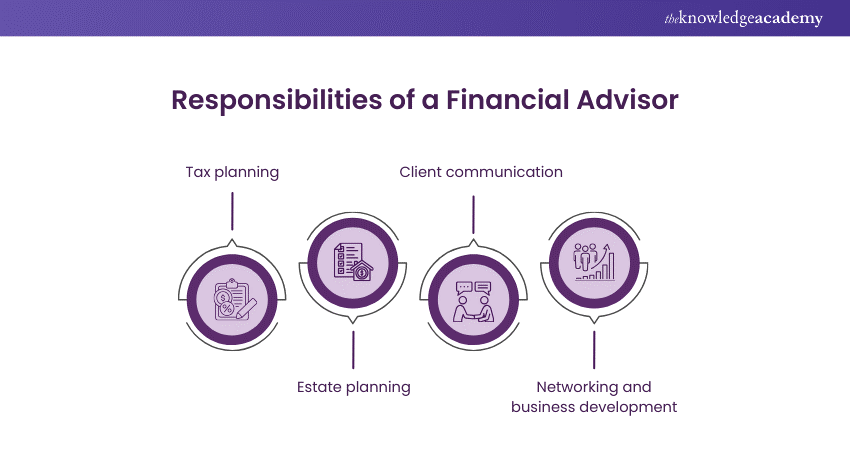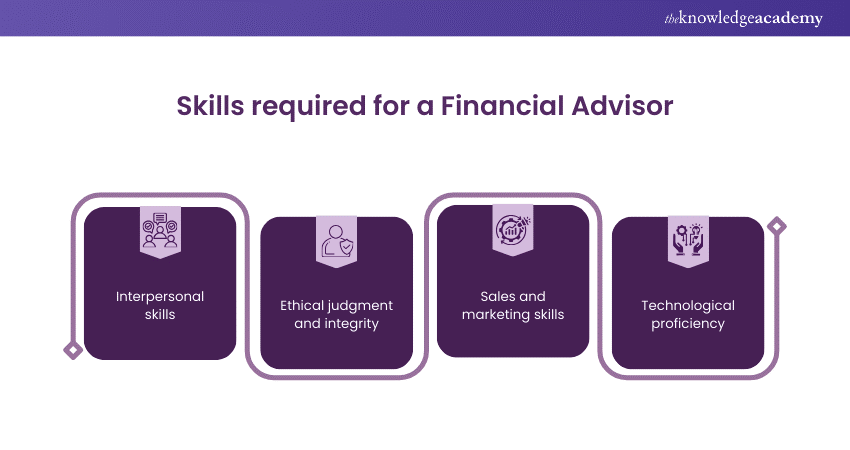We may not have the course you’re looking for. If you enquire or give us a call on +1 6474932992 and speak to our training experts, we may still be able to help with your training requirements.
Training Outcomes Within Your Budget!
We ensure quality, budget-alignment, and timely delivery by our expert instructors.

Becoming a Financial Advisor can open the door to influencing others in the field of finances, while the working experience boosts individual and career growth. If you have a knack for solving complex Financial problems, this career will benefit you. In this blog, we will discuss How to Become a Financial Advisor so that you can succeed quickly.
There are also many alternative ways to blend your learnings with industry experience, which will help you be more prepared to play a vital role in Financial services. So, what are you waiting for? Dive deep into this blog and learn How to Become a Financial Advisor!
Table of Contents
1) Who is a Financial Advisor?
2) Responsibilities of a Financial Advisor
3) Qualifications required to become a Financial Advisor
4) Skills required for a Financial Advisor
5) How to Become a Financial Advisor?
6) Areas of Financial advice to focus on
7) Financial Advisor salary insights
8) Conclusion
Who is a Financial Advisor?
The Financial Advisor is a specially trained individual who assists clients in solving personal money matters and making future Financial plans. They offer customised counselling regarding investment, saving, tax, retirement planning, and insurance, which can help clients attain their Financial goals.
Financial Advisors plunge into their clients' economic lives and understand their short—and long-term needs. Then, they build a strategy tailored specifically for them. To provide the best advice, they need to be constantly aware of changes in the market and legal requirements.
Usually, having a degree and certificates related to the job they recruit for is a must to maintain professional standards and maintain trust among people. Their task is undoubtedly vital in assisting clients in navigating the densely tangle of Financial domains.
What does a Financial Advisor do?
The Financial Advisor offers holistic counselling on controlling and conserving wealth, guiding people to make the right Financial decisions. Their primary tasks are evaluating customers' economic profiles, determining their short—and long-term expectations, and creating custom strategies for investments, savings, retirement, insurance, and tax planning activities.
Some Financial experts help with estate structuring, debt handling, and devising techniques to increase capital. They constantly monitor and follow up on their economic strategies, adjusting whenever market scenarios or clients undergo life changes.
A Financial Advisor is vital in ensuring clients make educated decisions in sync with their Financial objectives, eventually helping them achieve assured Financial security and growth.
Responsibilities of a Financial Advisor
These are some of the most critical responsibilities of a Financial Advisor:

a) Client assessment: To provide efficient planning, clients' profiles, objectives, risk assessments, and life stages must be applied in planning development.
b) Financial planning: Construct an all-inclusive strategy covering savings, taxes, investments, insurance, and retirement and ensure that it dovetails with the client's objectives in the immediate and long term.
c) Investment management: Identify the most appropriate investment portfolios and individual securities based on each client's Financial objectives and risk tolerance. Track investments and rebalance them as needed.
d) Risk management: Analyse possible threats that inherently endanger clients’ Financial strategies and provide insurance products, such as life, health, and property insurance, that can neutralise these hazards.
e) Client education: Educate clients on investing issues, including the gains and losses of different investment products, savings techniques, and the effect such Financial decisions have on their economic well-being.
f) Regulatory compliance: Follow and obey all regulatory requirements and ethical Financial planning and portfolio management standards.
g) Tax planning: Help clients understand the tax implications and minimisation strategy in their investments and Financial decisions while recommending appropriate tax minimisation approaches.
h) Estate planning: Guide designing the right estate plan, including its proper management and inheritance.
i) Client communication: Maintain frequent contact with customers to keep them informed about their Financial position, what may have changed in the market that would affect their investments or personal finance plans and any modifications that you think are necessary to the plan.
j) Networking and business development: Engage in client prospecting through networking, seminars, or referrals; strive toward developing and sustaining mutually rewarding partnerships for the long haul.
Qualifications required to become a Financial Advisor
To become a successful Financial Advisor, several qualifications are essential, spanning education, certifications, and skills:
a) Education: Most Financial Advisors possess Bachelor's degrees in Economics, finance, accounting, and business. This educational foundation allows them to apply accounting and finance principles in various areas, such as setting up and managing an enterprise, developing investment projects, and settling tax issues.
b) Certifications: Certification must be gained to prove your expertise and credibility. Firstly, proclaimed certifications such as 'Certified Financial Planner,' ' The Chartered Financial Analyst,' and' Certified Public Accountant' must be emphasised. Those certifications demand that candidates pass a detailed test and attend post-graduate training.
c) Licensing: Different Financial Advisors need different licenses depending on their service areas. For example, you will need a state-specific insurance license to sell products. You usually register with state regulators or the Securities and Exchange Commission (SEC) to offer investment advice.
d) Experience: Bachelor's degree holders with actual working experience in Financial planning or related fields can have an absolute wealth of knowledge. These advisors start in roles like bankers, insurers, and investment consultants to acquire relevant experience.
e) Skills: Key qualities needed here are high analytical capabilities, good communication skills, attention to detail, and problem-solving abilities. In addition, counsellors must understand ethical rules and professional behaviour standards to earn their clients' confidence.
f) Continuing education: Keeping abreast of the most rigorous regulations, products, and technology must also be an ongoing affair, which prescribes continuous education and professional development.
Are you interested in learning all Financial concepts? Then register now for our Finance for Non-Financial Managers Training!
Skills required for a Financial Advisor
Financial Advisors need hard and soft skills to manage client relationships and give sound Financial advice competently.

a) Analytical skills: Reading Financial information, decoding economic trends, and evaluating the investment markets to make intelligent choices.
b) Communication skills: Competence in summarising intricate information concisely and persuasively to customers in writing and verbally.
c) Listening skills: It is critical to determine the client's needs, wants, and possible concerns to provide suitable Financial solutions.
d) Problem-solving skills: Ability to detect problems and provide effective solutions for Financial strategies, considering client needs personally.
e) Mathematical skills: Well-developed quantitative skills for calculating investment returns, tax liabilities, and other Financial data.
f) Attention to detail: Accuracy in Financial document management, compliance with regulatory requirements, and the exquisite way Financial plans are outlined and executed.
g) Interpersonal skills: Building and maintaining relationships is vital in earning client trust and fostering customer engagement in the long run.
h) Ethical judgment and integrity: Maintaining high moral standards and keeping confidentiality to build trust and comply with the law and regulations.
i) Sales and marketing skills: Effective Sales and Marketing and client development processes are essential for the long-term success of a Financial Advisory business.
j) Technological proficiency: Proficient in Financial planning software and keeping track of the latest technological advances in finance.
How to Become a Financial Advisor?
Here is a detailed step-by-step procedure for you to become a Financial Advisor:
1) Pursue a degree or higher-level apprenticeship
The first step towards the profession is acquiring the essential knowledge required. Financial Advisors usually have a Bachelor's degree in Finance, with Economics, Business Administration, or Accounting as majors or minors. This Bachelor's degree gives you the grounding to serve as a solid base for understanding the fundamentals of Financial disciplines and economic theories.
However, Apprenticeships at higher levels, which in most cases provide alternative routes, specifically in the UK, are also an alternative option. The main activity under these apprenticeships is the working and learning process, which creates an environment in which to train. At the same time, the participants are certified in finance and advising. Unity certificates them personally, and the top Financial oversight agencies acknowledge them.
2) Complete a training period
A training period is essential for the initial phase after accomplishing the educational requirements. Finally, it is the beginning stage, often represented by junior positions at banks, investment firms, or other Financial Advisory organisations.
During the internship, students respond to real-world scenarios and gain expertise from being mentored by skilled practitioners. The training covers investment strategies, client management, Financial planning, and compliance with legal standards, among other aspects.
3) Emphasise relevant skills and experience in your resume
When you apply for roles, focusing on successful skills or experiences connected to Financial Advisory is crucial. Analytical, conclusion-making, and client-facing abilities should be specified on your resume, along with information on using Financial software and experience in managing client portfolios.
In addition, the capacity to emphasise soft skills like proper communication, problem-solving and interpersonal skills should also be mentioned. These are key, as the skills to articulate complex Financial concepts in easily understandable language are, to any extent, clients’ trust and commitment.
Try to put your licenses clearly in the critical place. If you have certifications like the Certified Financial Planner (CFP) or Chartered Financial Analyst (CFA), put these at the beginning of the credentials section.
4) Develop your skills and client list
Development should be continuous to maintain the sector's positioning. That is the reality of a modern economic system. A Financial Advisor in the making ought to be aware of cutting-edge Financial instruments, the market climate, and the twists and turns of tax regulations. You will grow in knowledge through participation in industry seminars, successful learning more with additional certifications, and advanced course-taking achievements.
Developing your list of prospective clients is another step that is just as important. First, using networking to build partner relations is the way to do it. Consequently, through the recommendations of existing clients, seminars (e.g., Financial seminars) or community events, you also get to meet prospective clients.
Reliability and competence in the field will go a long way in winning the client’s trust. Stress that you provide customised services directed at the respective requirements of every client, which will likely make retention and referrals.
Learn how you can manage and minimise credit risk with our Introduction to Credit Control Course!
Areas of Financial advice to focus on
Finance advisors can have independent fields for each act, like supervisors for different areas of Financial management, such as debts, plans for retirement, and others. Here are some critical areas of Financial advice to focus on:
a) Retirement planning: Advisement on retirement plans is one of the critical areas that a Financial Advisor addresses. This encompasses not talking about looking at a client's current economic standing, projecting future demands, and reaching retirement goals, which would involve saving through 401(k) plans or IRAs and other investment options.
b) Investment advice: Guiding the selection of wealth conservation instruments and methods is also crucial to success. This teaches me about all kinds of investments (stocks, bonds, mutual funds) and how to manage risks comprehensively. Besides, an investor should diversify his portfolio to be safe.
c) Estate planning: Advising on achieving a fair balance between clients and after their death. Attorneys can guide their clients through writing wills, setting up trusts, and estate planning for sections so that the client’s assets are allocated among loved ones according to their desires and tax liabilities are minimised when it comes time for the assets to be distributed.
d) Tax planning: Involves educating clients about their tax obligations tied to Financial decisions and how specific programs or strategies can minimise tax liabilities. Thus, such a service may be recommended for effective tax-oriented investments, tax reliefs, and tax credits.
e) Insurance planning: Counselling clients on the utmost risk management via the proper insurance, including life, health, and disability, to avoid disastrous Financial damages from unpredictable situations.
f) Debt management: Provisions to help clients eliminate debts through debt management or reduction. Strategies cover many aspects, such as consolidating loans, working with creditors, or creating a set of payment plans with a specific structure.
Financial Advisor salary insights
Let’s have a quick look at this table, where we have shown the difference in salary ranges from one country to the other:
|
Country |
Average salary/year |
|
United Kingdom |
£80,000 |
|
United States |
$91,788 |
|
Singapore |
AED 99,000 |
|
Singapore |
SGD 51,204 |
|
India |
₹4,27,600 |
|
Canada |
$59,889 |
| Australia |
$101,41 |
Source: Glassdoor
Conclusion
Embarking on How to Become a Financial Advisor requires dedication, education, and ongoing professional development. Aspiring advisors can build rewarding careers by obtaining relevant qualifications, gaining practical experience, honing essential skills, and helping numerous clients achieve their Financial goals with confidence and expertise.
Do you want to learn how to analyse Financial techniques? Then sign up now for our Financial Management Course!
Frequently Asked Questions

To become a Financial Advisor, you usually must study for at least a bachelor's degree for four years and then may take the CFP certifications, which may take a couple of months or years, depending on one's studying pace.

This job's two downsides include the long working hours (especially at the start when building the clientele) and stress because of managing your clients' portfolios.

The Knowledge Academy takes global learning to new heights, offering over 30,000 online courses across 490+ locations in 220 countries. This expansive reach ensures accessibility and convenience for learners worldwide.
Alongside our diverse Online Course Catalogue, encompassing 17 major categories, we go the extra mile by providing a plethora of free educational Online Resources like News updates, Blogs, videos, webinars, and interview questions. Tailoring learning experiences further, professionals can maximise value with customisable Course Bundles of TKA.

The Knowledge Academy’s Knowledge Pass, a prepaid voucher, adds another layer of flexibility, allowing course bookings over a 12-month period. Join us on a journey where education knows no bounds.

The Knowledge Academy offers various Accounting & Finance Training, including the Finance for Non-Financial Managers Course, Financial Management Course, and Financial Modelling Course. These courses cater to different skill levels, providing comprehensive insights into Financial Management Software.
Our Business Skills Blogs cover a range of topics related to Finance and Accounting, offering valuable resources, best practices, and industry insights. Whether you are a beginner or looking to advance your Accounting skills, The Knowledge Academy's diverse courses and informative blogs have got you covered.
Upcoming Business Skills Resources Batches & Dates
Date
 Financial Management Course
Financial Management Course
Fri 9th Aug 2024
Fri 25th Oct 2024







 Top Rated Course
Top Rated Course



 If you wish to make any changes to your course, please
If you wish to make any changes to your course, please


